英语(仁爱版)七升八暑假精品课程 第9讲 表示请求和建议
仁爱版英语八年级下册7、8单元知识整合

仁爱版英语八年级下册知识点整合(Unit 7—Unit 8)-1-1.know about 了解2.start to do sth.开始做某事3.have/hold a sports meeting 举行运动会4.turn to (sb.)=ask (sb.)for help 向某人求助5.make a poster 制作一张海报6.get in touch with 和...取得联系7.think about (认真)考虑8.疑问词who,what,which,when ,where,how+to do 在句中作主语,宾语,表语9.try one’s best=do one’s best 尽某人最大努力10.have a sweet tooth 喜欢吃甜食11.such as 例如,用来列举事物时,一般列举同类人或事物中的几个例子,位于被列举的事物与前面的名词之间,as 后面不可加逗号,后面常接名词性的短语。
e.g.English are spoken in many countries,such as Australia and Canada.For example 用来列举说明某一论点或情况,一般只列举同类人或事物中的“一个”为例,可与For instance 互换使用。
e.g.You can do many sports here.For example,you can play tennis.12.enough 作副词时,修饰形容词或其他副词,表示“足够地,十分地”;作形容词时,修饰不定代词。
在这两种情况下,它只可放在所修饰的词之后。
e.g.This book is easy enough for you to understand.enough 修饰名词的时候,可以置于名词前或名词后。
e.g.I have enough money to buy the book.enough 还可作代词,表示“够,足够,充足”。
初一英语同步提高上学期课程 (新仁爱版) 课后练习及其答案和详细解析
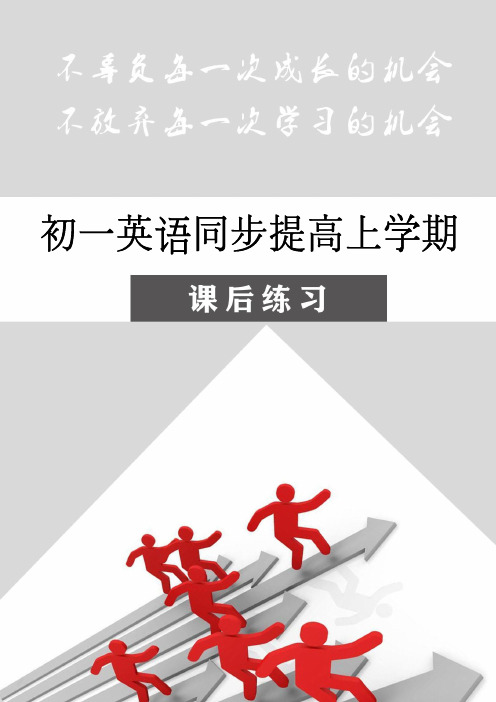
题三:
翻译:
1.这不是我的铅笔盒。
2.这个是我的橡皮,那个是你的。
题四:
翻译:
1.这是你的英语书吗?
2.---那是什么?
---哦,那是露西的猫。
题五:
翻译:
1.用英语说这是一把尺子。
题六:
翻译:
1.你能用英语说它吗?
题七:
1.---Can you spell your name, please?
B: Yes,please.
A:2
B: My name isKate.
A:Gladto meet you, Kate.Are youa student?
B:3I study inBeijing.
A: Where are you from?
B:4
A: Thank youfor answering my questions.
( )4.How do you do!D.Yes, it is.
( )5. Is thisanegg?E. I’mfine.
题一十:
从B栏中找出与A栏相对应的答语。
AB
( )1.Nice to meet you!A.That’s OK.
( )2.What class are you in?B. M-A-P, map.
A. theB. aC.不填D. an
5. My brother is ______ student in No. 1 Middle School.
A. theB. aC.不填D. an
6. ---Thank you very much!
---______.
A. That’s all rightB. No, thanksC. That’s rightD.All right
英语(仁爱版)六升七暑假精品课程 第09讲 Unit 4 Topic 1
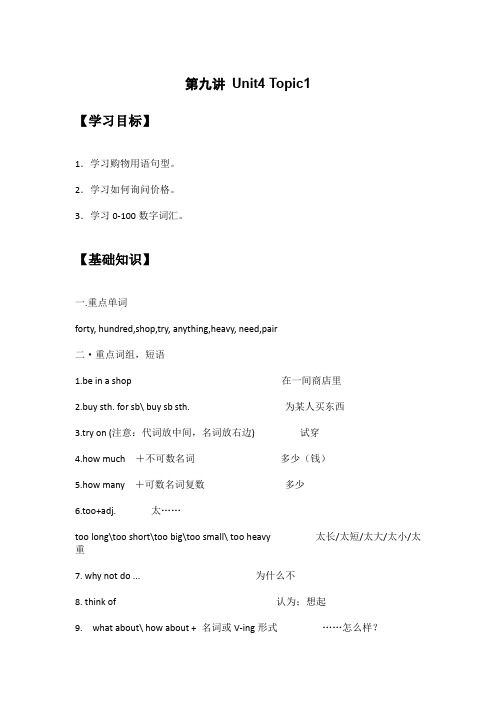
第九讲Unit4 Topic1【学习目标】1.学习购物用语句型。
2.学习如何询问价格。
3.学习0-100数字词汇。
【基础知识】一.重点单词forty, hundred,shop,try, anything,heavy, need,pair二·重点词组,短语1.be in a shop 在一间商店里2.buy sth. for sb\ buy sb sth. 为某人买东西3.try on (注意:代词放中间,名词放右边) 试穿4.how much +不可数名词多少(钱)5.how many +可数名词复数多少6.too+adj. 太……too long\too short\too big\too small\ too heavy 太长/太短/太大/太小/太重7. why not do ... 为什么不8. think of 认为;想起9. what about\ how about + 名词或V-ing形式……怎么样?10. think about 考虑11. come to 向某人走来12. make a shopping list 列购物清单13. do some shopping =go shopping 购物/去购物14. one kilo\ bag\ loaf\ bar\ bottle\ tin\ glass of +可数名词的复数形式\不可数名词一公斤\一袋\一条\一块\ 一瓶\ 一听\一杯...15. two kilos\ bags\ loaves\ bars\ bottles\ tins\ glasses of +可数名词的复数形式\不可数名词两公斤\两袋\两条\两条\两块\两瓶\两听\两杯...16.a pair of trousers \ pants 一条裤子17. how heavy 多重?三.重点句型1.What can I do for you?我能为你做什么?与May/Can I help you?功能相同,但二者回答有细微不同,注意区分。
英语(仁爱版)七升八暑假精品课程 第2讲 乘坐交通工具的多种表达
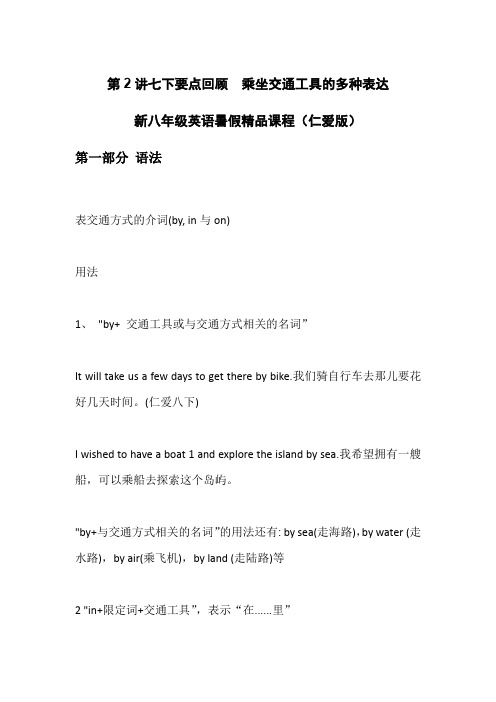
第2讲七下要点回顾乘坐交通工具的多种表达新八年级英语暑假精品课程(仁爱版)第一部分语法表交通方式的介词(by, in与on)用法1、"by+ 交通工具或与交通方式相关的名词”It will take us a few days to get there by bike.我们骑自行车去那儿要花好几天时间。
(仁爱八下)I wished to have a boat 1 and explore the island by sea.我希望拥有一艘船,可以乘船去探索这个岛屿。
"by+与交通方式相关的名词”的用法还有: by sea(走海路),by water (走水路),by air(乘飞机),by land (走陆路)等2 "in+限定词+交通工具”,表示“在......里”Carl's dad saw me on the street and gave me a lift in his car.卡尔的爸爸在街上看见了我,便载了我一一程。
You can study in the train on the way to school.你可以在去学校路上的火车上学习。
3 "on+限定词+交通工具”,表示“在......上”I like going to school on my bike.我喜欢骑自行车去上学。
该用法还有: on a horse (骑马),on the donkey(骑驴)等:但on foot (步行)为习惯用法,不加限定词4.用某些动词短语来表示交通方式。
如:walk to步行去;drive to开车去;ride to 骑马去、骑车去;fly to乘飞机去。
注意:如果后边接地点副词here,there,home等,不用介词to。
如:You can drive here.出行方式汇总:步行on foot walk to骑自行车by bike on a bike ride a bike乘公共汽车by bus on a bus take a bus乘小汽车by car in a car drive a car乘船by boat ship/sea on a boat ship乘地铁by subway in a subway take the subway 乘火车by train in/on a train take the train乘飞机by plane/ air in/on a plane fly to第二部分交通方式表达专项训练(含解析)一、单项选择1.My family often go to the park______bike_______spring.A.on; at B.by; at C.on; in D.by; in2.The People's Park is a little far from here. You can get there _________ the bus.A.by B.on C.to D.for3.They can go to the Century Park ______ underground.A.take B.by C.in D.on4.—does it take to get to school ? —It takes about 15 minutes foot .A.How far ; on B.How long ; on C.How often ; by5.—How do you usually come to school?—I usually ______ a bike. Sometimes I come ______ my mother’s car. A.by; by B.ride; by C.by; in D.ride; in6.Mr Brown usually drive to the park on Sundays. But today he goes to the park_____ foot.A.in B.on C.by D.Of7.--How do you usually______school?--I usually go to school______the school bus.A.get to; take B.get: by C.get to; on D.get to; by8.That place is far from here.It's best to go there ________ bus.A.to B.byC.of D.on9.Her mother goes to work ________ bus every morning. A.by B.at C.on10.---Do you usually go to school _______ bike?---No, I go to school ______ my father’s car.A.by; to B.in; by C.in; in D.by; in 11.Mr Wang often goes to work___________.A.by a bus B.takes the busC.by bus D.take a bus12.Jill goes to school ________ her bike every day.A.in B.on C.with D.by13.—Does your mother go to work ________ car?—No, she often goes to work ________ bike.A.a; a B.by; by C./; a D.in; by14.Do you usually go to school ________ bus or ________ foot? A.by; by B.on; by C.by; on D.on; in 15.—How does Owen usually go to the zoo?—He goes there ________ a bike.A.by B.on C.ride D.to ride16.He wants to go there ______his bike,but I'd like to______ there. A.on;take the undergroundB.by;take an undergroundC.on;on the undergroundD.by;take an underground to17.It takes about thirty minutes from my home to school ______. A.to by underground B.by the undergroundC.to on underground D.on the underground18.My cousin William goes to work ________from Wednesday to Friday. A.by a car B.on his car C.in a car D.by foot 19.—I usually go to school ________ car. How about you?—I often ________a bus to go to school.A.with, by B.on, in C.by, take D.with, take20.—How do your parents go to work?—My father goes to work_______car and my mother________the bus to work.A.by; takes B.take; by C.by; on D.drive; takes二、同义句转化21.I usually take a bus to school. (改写句子,句意不变)I usually go to school ________________.22.Rick rides his bike to school every day. (改写句子,句意不变)Rick goes to school ________ ________ every day.23.Sometimes Dick and Jack drive to work. (改为同义句) Sometimes Dick and Jack go to work ________ ________.三、完成句子24.——去年谁骑自行车周游了五个国家?——米莉的哥哥。
仁爱7下Unit8 topic2 The summer holidays are coming知识点

The summer holidays are coming.授课对象:初一学生授课时间: 年月日一、教学内容一、重点短语talk about 谈论到,谈及holiday plans 假日计划plan to do something 计划做某事wish to do 希望做某事travel around the country 环绕国家take pictures / photos of 给…照相go back to 回到hope to do 希望做某事get together with 和……聚在一起places of interest 名胜古迹go ……for a holiday 去度假the best time to do 最好的时间做某事all year round 一年到头take sth with sb. 随身携带had better (not) do sth.最好做某事a pair of 一双/对take a trip 旅行prepare for 准备put on 穿上in the sun 在阳光下be different from 与……不同二、重点句型1.The summer holidays are coming.2.I hope to get together with them.3.Each of us has a good plan for the holidays.4.What’s the best time to go there? I think you can go anytime.三、语言点1.The summer holidays are coming. 正在进行时表示将来。
2.hope to do sth. 希望做某事hope sb. +词组或句子希望你......①类似的有:wish, want, plan, would like 希望/ 想要/ 打算/ 愿意......后接动词不定式作宾语。
英语(仁爱版)七升八暑假精品课程 第16讲 形容词的比较级和最高级

第16讲八上新知专题形容词的比较级和最高级新八年级英语暑假精品课程(仁爱版)第一部分语法一、形容词的比较级和最高级的构成规则(1)单音节词和少数以-er,-ow结尾的双音节单词,比较级在后面加-er,最高级在后面加-est。
①单音节单词small→smaller→smallest short→shorter→shortesttall→taller→tallest great→greater→greatest②少数以-er,-ow结尾的双音节单词clever→cleverer→cleverest narrow→narrower→narrowest (2)以不发音e结尾的单音节单词,比较级在原形后加-r,最高级在原级后加-st。
large→larger→largest nice→nicer→nicest able→abler→ablest (3)以一个辅音字母结尾的闭音节(即:辅音+元音+辅音)单词中,先双写末尾的辅音字母,比较级加-er,最高级加-est。
big→bigger→biggest hot→hotter→hottest fat→fatter→fattest(4)以“辅音字母+y”结尾的双音节词,把y改为i,比较级加-er,最高级加-est。
easy→easier→easiest heavy→heavier→heaviestbusy→busier→busiest happy→happier→happiest(5)其他双音节词和多音节词,比较级在前面加more,最高级在前面加most。
beautiful→more beautiful→most beautifuldifferent→more different→most differenteasily→more easily→most easily(6)有少数形容词、副词的比较级和最高级是不规则的,必须熟记。
good→better→best well→better→bestbad→worse→worst ill→worse→worstold→older/elder→oldest/eldestmany/much→more→most little→less→leastfar →further/farther→furthest/farthest记住一个口诀:两好,两坏和两多;一小,一远和一老二、形容词比较级的用法(1)“甲+be+(倍数)+形容词比较级+than+乙”表示“甲比乙…”或“甲比乙…几倍”。
七年级英语Unit 8 Topic 2 The summer holidays are coming

初一英语Unit 8 Topic 2 The summer holidays are ing仁爱版【本讲教育信息】一. 教学内容:Unit 8:The Seasons and the WeatherTopic 2:The summer holidays are ing .二. 教学重难点:单词:travel 旅行country 国家农村hope 希望together 一起,共同interest 兴趣each 每人the United States 美国Germany 德国New Zealand 新西兰Brazil 巴西Thailand 泰国Indonesia 印度尼西亚India 印度anytime 在任何时候, 随便什么时候expensive 昂贵的camera 照相机backpack 背包旅行包cellphone 可移动tent 帐篷raincoat 雨衣map 地图trip 旅行旅程custom 习俗enter 进入off 离开wet 湿的point 指向Muslim 穆斯林touch 触摸Korea 朝鲜Italy 意大利finger 手指wrap 包,裹gift 礼物赠品paper 纸pass 传, 递during 在……期间greeting 问候,祝贺famous 著名的词组: get together 聚会, 联欢places of interest 名胜the Palace Museum 故宫Mount Tai 泰山take off 脱下, 摘掉, 起飞gift money 压岁钱May Day 国际劳动节be different from 与……不同句型:1. I miss my parents.2. Each of us has a good plan for the holidays .3. I hope you all have a good time.4. I think you can go anytime.5. You should visit Dali and Lijiang. And you shouldn’t miss Xishuangbanana.6. It sounds really interesting !7. In Brazil , people never go out with their hair wet.8. In Indonesia, you mustn’t point to anything with your foot.9. Don’t wrap gift money in white , blue or black paper.10. … and it is very different from ours.11. Please give my love to your parents.12. I wish to travel around the country and take pictures.13. I’d like to travel to some places of interest in China.14. In Japan, when you enter someone’s home, you should take off your shoes.15. Don’t touch a child on the head in Thailand.16. I went to Sichuan with my family during the May Day holiday.17. It is very different from ours.语法:一般过去时的特殊疑问句三. 具体内容:金点10:本话题的主要语法项目——一般过去时的特殊疑问句形式。
八年级英语暑假专题:复习Unit 9~11知识点北师大版知识精讲
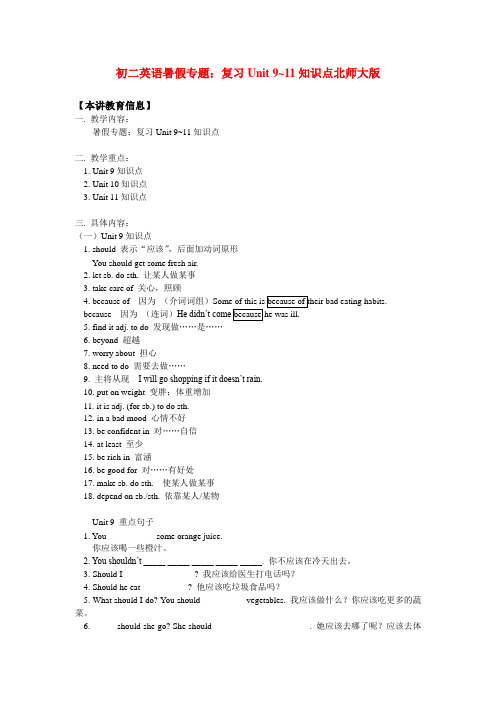
初二英语暑假专题:复习Unit 9~11知识点北师大版【本讲教育信息】一. 教学内容:暑假专题:复习Unit 9~11知识点二. 教学重点:1. Unit 9知识点2. Unit 10知识点3. Unit 11知识点三. 具体内容:(一)Unit 9知识点1. should 表示“应该”,后面加动词原形You should get some fresh air.2. let sb. do sth. 让某人做某事3. take care of 关心,照顾4. because of 因为(介词词组)because 因为(连词)5. find it adj. to do 发现做……是……6. beyond 超越7. worry about 担心8. need to do 需要去做……9. 主将从现I will go shopping if it doesn’t rain.10. put on weight 变胖;体重增加11. it is adj. (for sb.) to do sth.12. in a bad mood 心情不好13. be confident in 对……自信14. at least 至少15. be rich in 富涵16. be good for 对……有好处17. make sb. do sth. 使某人做某事18. depend on sb./sth. 依靠某人/某物Unit 9 重点句子1. You _____ _____ some orange juice.你应该喝一些橙汁。
2. You shouldn’t _____ _____ _____ _____ _____. 你不应该在冷天出去。
3. Should I _____ _____ _____? 我应该给医生打电话吗?4. Should he eat _____ _____? 他应该吃垃圾食品吗?5. What should I do? You should_____ _____vegetables. 我应该做什么?你应该吃更多的蔬菜。
第06讲Unit3-【暑假自学课】2024年新七年级英语暑假提升讲义(人教版2024)

第06讲Unit 3 My school!模块一思维导图串知识模块二基础知识全梳理(吃透教材)模块三教材习题学解题模块四核心考点精准练模块五小试牛刀过关测1.Listening:Conversations about places in the new school.2.Speaking:Talk about the classroom.3.Reading:An email to a friend about the new school.4.Writing:Email a friend to describe your school.Grammar: There be structure.Prepositions of position( in front of, behind, between ,next to,across from)1、It's in front of the art building. 它在艺术楼的前面.(教材第36页1a) 考频:★★★in front of 意思是“在......前面”。
如:I sit in front of him. 我坐在他的前面。
拓展:in front of 与in the front ofin front of 表示“在.......(外部)前面”,反义词:behindI sit in front of him. 我坐在他的前面。
= He sits behind me. 他坐在我的后面。
in the front of 表示“在......(内部)前部”,反义词:at the back ofI sit in the front of the classroom. 我坐在教室的前部。
2、The teachers’building is across from the school hall. 教师办公楼在学校礼堂的对面。
(教材第36页1a) 考频:★★★across from 表示“在.......对面”,相当于opposite。
英语(仁爱版)七升八暑假精品课程 第7讲 一般过去时
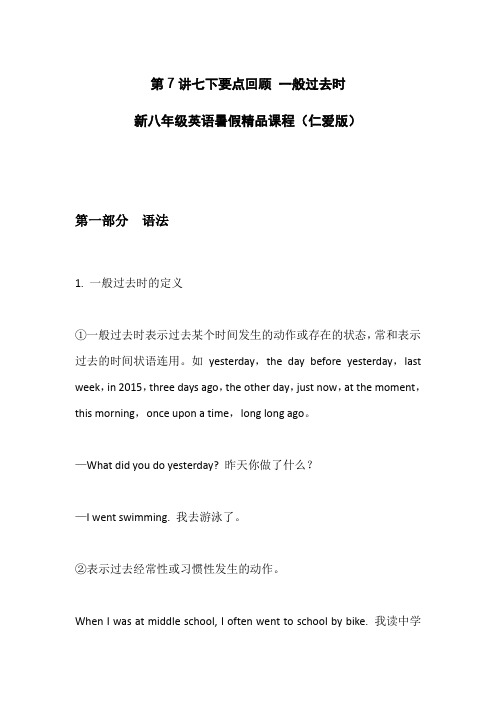
第7讲七下要点回顾一般过去时新八年级英语暑假精品课程(仁爱版)第一部分语法1. 一般过去时的定义①一般过去时表示过去某个时间发生的动作或存在的状态,常和表示过去的时间状语连用。
如yesterday,the day before yesterday,last week,in 2015,three days ago,the other day,just now,at the moment,this morning,once upon a time,long long ago。
—What did you do yesterday? 昨天你做了什么?—I went swimming. 我去游泳了。
②表示过去经常性或习惯性发生的动作。
When I was at middle school, I often went to school by bike. 我读中学时经常骑自行车去学校。
2. 一般过去时的基本结构①实义动词肯定句:主语+ 动词过去式+ 其他.I went to the cinema yesterday. 我昨天看了电影。
否定句:主语+ didn’t + 动词原形+ 其他。
I didn’t go to the cinema yesterday. 我昨天没看电影。
一般疑问句及其回答:Did + 主语+ 动词原形+ 其他?肯定回答:Yes, 主语+ did.否定回答:No, 主语+ didn’t / did not.—Did you go to the cinema yesterday? 你昨天去看电影了吗?—Yes, I did./No, I didn’t. 是的,我去了。
/ 不,我没去。
特殊疑问句:特殊疑问词+did+主语+动词原形+其他?—Where did you go yesterday? 你昨天去哪儿了?—I went to the cinema yesterday. 我昨天去看电影了。
七年级下册英语仁爱版u8知识点

七年级下册英语仁爱版u8知识点篇章一:Unit 8词汇知识点在学习Unit 8时,掌握一定的词汇量是非常重要的。
以下是Unit 8相关的一些知识点:1. refuse:拒绝Peter refused to go to the party.彼得拒绝参加聚会。
2. invitation:邀请I received an invitation to Lisa's birthday party.我收到了去丽莎生日聚会的邀请。
3. donate:捐赠The wealthy man donated millions of dollars to charity.这个富有的人向慈善机构捐赠了数百万美元。
4. local:当地的We went to a local restaurant for dinner.我们去了一家当地的餐馆吃晚餐。
5. environment:环境We should do our best to protect the environment.我们应该尽力保护环境。
6. organization:组织机构The Red Cross is a famous humanitarian organization.红十字会是一个著名的人道主义组织。
篇章二:Unit 8语法知识点除了词汇之外,Unit 8还有一些重要的语法知识点,如下:1. 趋向动词时态表示某个行为或状态要持续一段时间或会不断发生,要使用趋向动词时态。
常用的趋向动词时态包括:- be going to + 动词原形- will/shall + 动词原形- be + 动词现在分词例如:I am going to study English for two hours tonight.我今晚要学习英语两个小时。
2. 直接和间接宾语在英语中,一个动词可能既有直接宾语,又有间接宾语。
直接宾语是指句子中动作的接受者或所操作的对象,而间接宾语则是接受动作的人或者事物。
暑假升初一英语第9讲(新课预习语法专题综合测练)(广州牛津版专版)(word版含答案)U5-6(1)

【暑假学霸精英班】升初一英语第九讲(新课预习+语法专题+综合技能测练)学习目标:1.七年级上册英语Unit5-62. 语法专题(一般将来时&条件状语从句)3. 综合技能测练Part I 七年级上册英语Unit5-6【Ex1】根据首字母及句意进行单词拼写。
1.I feel so n___________ about my coming exam.2.Sue hopes to travel into s_____________ by spaceship like Jing Haipeng.3.The teacher came into the classroom w_____________ taking anything.4.I want to buy a c_____________ as a gift for my mother. She likes taking photos.5.If you are lost at night, you can find the Polestar (北极星) and you will know the d___________ of north.6.Guangzhou Tower is the one of the most beautiful b____________ in China.7.Baiyun Airport is quite m_______________. It came into service since 2004.8.Take a deep b_________________ when you feel nervous.9.Let’s read the food g_________________ to find a good restaurant to eat this evening.st summer I went to Bali Island. I shall never forget the b__________ of that island.【Ex2】用所给单词的适当形式填空1. The Maths problem is difficult and we can't finish it by __________(our).2. What do you want ___________(do) this afternoon?3. It is the best place for us ___________ (have) a rest.4. Tony is too tired ____________ (breathe) after running.5. There will be a beautiful pool for you ___________(swim).6. There are many big_________(rock) on the road. We can't drive through them.7. When I travel to a new city, I always send some ___________ (postcard) to my friends.8. My mother always ___________ (return) home after 7 o'clock.9. He will buy five new ____________ (machine) for his factory.10. Mr Smith is very rich. He will buy a big house with two _________ (garden).11. We ran out to the ____________(central) of the city this morning.12. The teacher draws a map of ____________(Asian) on the blackboard.13. My mother bought me lots of _____________(tradition) books and magazines.14. A snake wriggled(蜿蜒而行) _______________(cross) the road.15. You should treat us as part of the ___________(nature) world.16. I want to go __________ (sightsee) and enjoy the natural __________(beautiful).17. It's dark outside. Linda, please turn on all the _____________(light).18. This is one of the highest _____________(build)in Guangzhou.19.When he ___________(come)back, I'll tell you.20.He ____________(direct)us to leave the burning building.【Ex3】完成句子1. 有了太空衣我能够在月球上呼吸。
初升高英语暑假衔接第09讲 Unit1 Teenage Life 核心单词知识句型 (学生版)

第09讲Unit1Teenage Life一、核心单词讲解1.volunteer n.志愿者v.自愿做;义务做●volunteer to do sth自愿做某事●voluntary adj.自愿的;志愿的do some voluntary work做志愿工作2.debate n.辩论争论vi.&vt.辩论;讨论;争论under debate正在讨论中have a debate with sb on/about/over sth和某人就某事进行辩论/讨论【联想】①discuss v.讨论②quarrel n.&v.争吵③argue争论主张3.prefer vt.(preferred,preferred,preferring)较喜欢;更喜欢;喜欢……多于……●prefer sth to sth喜欢……多于……prefer doing sth to doing sth..与……相比更喜欢prefer to do sth rather than do sth●preference n,偏爱;优先权;偏爱的事物show/have preference for偏爱……4.content n.内容;【pl.】容纳的东西;目录;(书、讲话、节目等的)主题;【U】含量adj.满足的,满意的vt.使满足eg.With so much related experience,I am sure you will be content with me,(求职信)有了这么多相关的经验,我相信你会对我满意的。
We can't go abroad this year,so we'll have to content ourselves with a holiday in Shanghai.今年我们不能出国,所以我们得满足于在上海度假。
She dropped her purse and the contents fell out on the floor.(动作描写)她的钱包掉了,里面的东西掉在地板上了。
英语(仁爱版)六升七暑假精品课程 第08讲 Unit 3 Topic 3
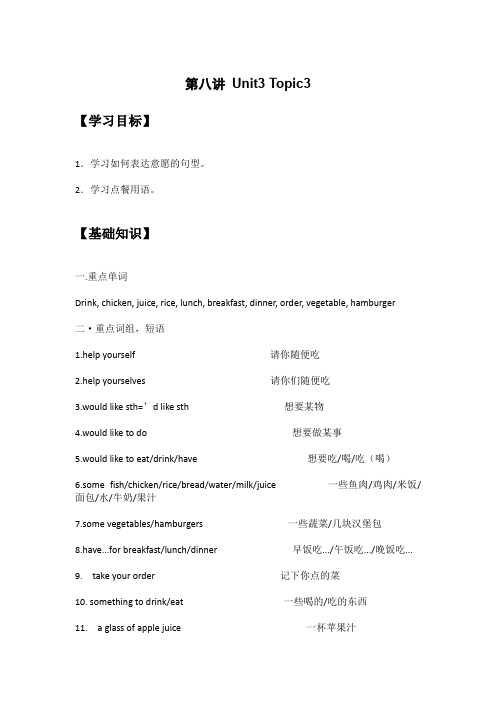
第八讲Unit3 Topic3【学习目标】1.学习如何表达意愿的句型。
2.学习点餐用语。
【基础知识】一.重点单词Drink, chicken, juice, rice, lunch, breakfast, dinner, order, vegetable, hamburger 二·重点词组,短语1.help yourself 请你随便吃2.help yourselves 请你们随便吃3.would like sth=’d like sth 想要某物4.would like to do 想要做某事5.would like to eat/drink/have 想要吃/喝/吃(喝)6.some fish/chicken/rice/bread/water/milk/juice 一些鱼肉/鸡肉/米饭/面包/水/牛奶/果汁7.some vegetables/hamburgers 一些蔬菜/几块汉堡包8.have...for breakfast/lunch/dinner 早饭吃.../午饭吃.../晚饭吃...9. take your order 记下你点的菜10. something to drink/eat 一些喝的/吃的东西11. a glass of apple juice 一杯苹果汁12. eat out 出去吃饭13. have breakfast/lunch/dinner with me 和我吃早饭/午饭/晚饭14. what about=how about 怎么样15. why not +动词原形为什么不16. be kind to sb. 对某人友好三.重点句型1.Help yourself /yourselves to some fish.请你/你们随便吃些鱼肉吧。
Help yourself /yourselves是主人招待客人时的常用语,意为“请随便(吃/喝)”。
如果被招待者是一个人,用Help yourself;若是两个或两个以上用Help yourselves。
英语(仁爱版)六升七暑假精品课程 第10讲 Unit 4 Topic 2
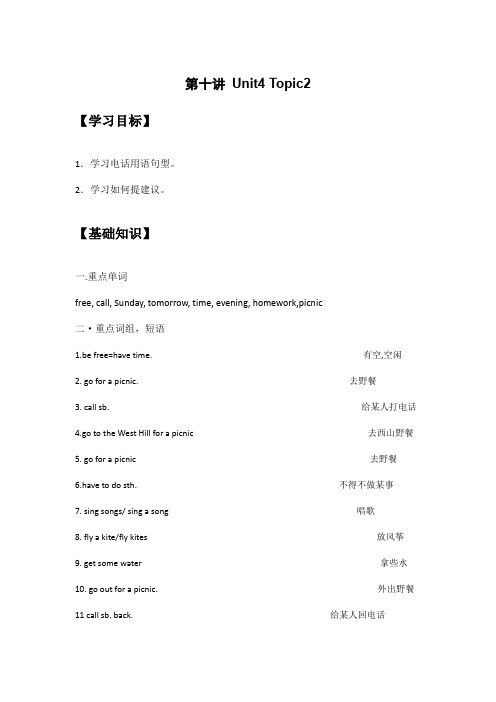
第十讲Unit4 Topic2【学习目标】1.学习电话用语句型。
2.学习如何提建议。
【基础知识】一.重点单词free, call, Sunday, tomorrow, time, evening, homework,picnic二·重点词组,短语1.be free=have time. 有空,空闲2. go for a picnic. 去野餐3. call sb. 给某人打电话4.go to the West Hill for a picnic 去西山野餐5. go for a picnic 去野餐6.have to do sth. 不得不做某事7. sing songs/ sing a song 唱歌8. fly a kite/fly kites 放风筝9. get some water 拿些水10. go out for a picnic. 外出野餐11 call sb. back. 给某人回电话12. speak to sb. 跟某人说话13. ask sb. to do sth 叫某人去做某事14. on the way home 在回家的路上15. have a picnic 野餐16. be in= be at home 在家17. at the beginning of 在...开始时18. in the end 最后19. go shopping 去购物20. go fishing 去钓鱼21. this Sunday afternoon 这周天下午22. do one's homework 做家庭作业三.重点句型1.Hello,this is Kangkang.你好,简!我是康康。
这是打电话用语,说“我是……”应用This is... speaking. 说“你是……吗?”应用Is that/it...speaking?询问“你是谁?”应用Who is this speaking?这些句子中的speaking往往可以省略。
英语(仁爱版)七升八暑假精品课程 第5讲 问路与指路
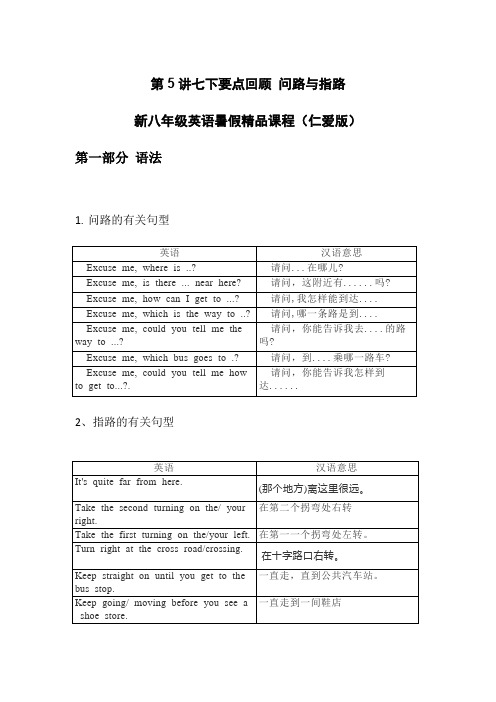
第5讲七下要点回顾问路与指路新八年级英语暑假精品课程(仁爱版)第一部分语法1.问路的有关句型2、指路的有关句型3、进一步详细问路4、方向词语第二部分问路、指路专项训练(含解析)一、单项选择1.—_____—Go up this street to the end.A.Where are we now?B.What are we doing in the library?C.How can I get to the library?2.—Excuse me, can you tell me the way to the nearest underground station?—________. You can ask the policeman over there.A.Have a good time B.No, thanks C.Sorry, I’m new here D.Yes, please3.—Excuse me, where is the post office, please?—________A.The way, please. B.This way, please. C.It’s way, please. D.I’m sorry to say that.4.—Excuse me, I’m new here. I can’t find my hotel.—______.A.You could ask the policeman for help B.You shouldn’t live in that hotelC.You must stay with me D.You needn’t call your friend5.—Excuse me. Could you tell me________to the bus station?—Sure. Go down this street and turn left.A.how to get B.where to get C.what to get D.when to get6.—Do you know when your uncle will come back from England?—________. He didn’t tell me about it.A.Good idea. B.What happened? C.Don't ask him. D.No idea.7.---Where's the restroom, please? -- __________You spoke too quickly.A.No problem B.My pleasure. C.Excuse me? D.Pardon me?8.--- _____________. Can you tell me the way to Xinhua Bookshop?--- Well, it’s just around the corner.A.I’m sorry. B.OK C.Excuse me D.Thank you9.—Excuse me, how could I get to the railway station?—_________________. You won't miss it.A.It's a little far from here B.Walk to the end of the roadC.I don't think you can go there D.OK. I'll show you around the city10.—_____ —Go up this road to the end.A.Where are we now? B.What are we doing at the supermarket?C.How can I get to the supermarket? D.Who can get to the supermarket?11.–Excuse me, where is the Moonlight Hotel?–.I’m a stranger myself.A.Sorry, I don’t know B.No, I don’t think soC.It doesn’t matter D.Thank you all the same.12.—Excuse me,can you show me how to go to Mr.Brown’s office?—Sure.A.Get out of hereB.I’m afraid I can’tC.Please wait hereD.Please come this way13.—Excuse me, can you tell me the way to the library?—I’m new here. ________.A.You could ask that man in red B.You shouldn’t walk alone C.You must stay with me D.You needn’t call your friend14.(2017·重庆A卷·37)—Excuse me,could you please tell me ________ the Science Museum?—Sure. Go along the street and turn left. It's next to Bank of China.A.when I can get to B.when can I get to C.how I can get to D.how can I get to 15.—Could you please tell me how to get to the restroom?—________.I'm not sure how to get there.A.Sorry B.OKC.Of course D.No problem16.—Could you please tell me where the museum is?—A.Sorry, I’m new here. B.Thanks very much. C.That’s a good idea. D.It’s your turn now. 17._______. Where is the bakery?A.I’m sorry B.Excuse meC.Hello D.Hi18.—_____ does your mother usually go to the office? —By bus. A.Where B.What C.How D.When 19.—I hear your father ________ to America once.—Yes. He ________ there last year.A.has been; went B.went; has beenC.goes; went D.has been; has been20.---How do you usually go to school?----________A.By a bus. B.On foot. C.On bike. D.with car二、填写适当的句子补全对话A: Hi, Cathy. Long time no see. 21.?B: Oh, I went to Xiamen for vacation in the summer holiday. I didn’t come back until last week.A: Xiamen is a good place to have fun. 22.?B: I visited many places there, such as Xiamen University, Gulang Island, South Putuo Temple and so on. And I also tried many delicious food. 23.?A: No, I didn’t. I just stayed at home to watch TV most of the time. I finished watching The Story of Yanxi Palace last month.B: Really? What do you think of it?A:24.. The story is really exciting. By the way, what are you going to doB: I’m going to the Sports Center to do some exercise.A: Wow! 25.?B: Twice a week. I think doing sports can make me healthier.在下列横线上填入适当的句子,补全对话。
七年级升八年级暑假衔接系统训练10 there be、请求、建议句型

七年级升八年级暑假衔接系统训练10姓名:_________●电影美文We become the most familiar strangers.我们变成了世上最熟悉的陌生人。
《乱世佳人》●课前限时阅读训练Once(从前)there was a king. He was very rich and1great power(权力). But he wasn’t happy. He was 2.It made him feel sad all the time. No doctor knew3was wrong with him. One day one of them 4 him, “After much thought and study, I have found out that there is only one way for you to get5.You must wear the shirt of a happy man. ”So the king sent(派)his men to every part of his land6 a happy man. First, they visited the rich and powerful(有权势的人). They asked these people if(是否)they were happy,7each of them answered that they didn’t know 8real happiness meant(意味).One day, one of t he king’s men met a woodcutter. “Are you happy? ”asked the king’s men. “As happy as the day is long, ”answered the woodcutter.“Oh, good! ”said the man, “9me your shirt. ”“Why? ”said the woodcutter, “I haven’tgot 10.”Mr and Mrs Brown lived in a small town near London with their child. Sometimes Mr Brown came back home from work very late, when his wife and the child were asleep, and then he opened the front door of this house with his key and came in very quiet.But one night when he was coming home very late, he lost his key, so when he reached his house, he rang the bell. Nothing happened. He rang it again. Again nothing happened.Nobody moved inside the house. Mr Brown knocked at(敲)the bedroom window, he spoke to his wife, he shout ed, but she didn’t wake up. At last he stopped and thought for a moment. Then he began to speak like a small child. \! Mother! ”he said. \! I want to go to the toilet! ”He spoke quite quietly but at once(立刻)Mrs Brown woke up. Then he spoke to her, and she opened the door for him.1.The Browns lived in a small town near London.2.Mr Brown’s wife and his child went to sleep after he came back from work.3.One night Mr Brown lost his key to the door, so he knocked at the front door and the bedroom window.4.Mr Brown said “ Mother”like a small child because he wanted his wife to wake up.5.Mrs Brown woke up at once when she heard the bell rang. She opened the door for her husband.●专题讲解there be1. There isn’t _____water in the glass. Let’s go and get some.A. manyB. lotsC. anyD. some2. There ___a lot of news about Zhang Ziyi on TV last night.A. wasB. hadC. isD. were3. There ____ many changes in the village recently.A. isB. areC. have beenD. to be4. ---There _______a lot of meat on the plate. Would you like some?---Just a little, please.A. isB. areC. amD. be5. There _______ some books, a ballpen and a ruler on the desk.A. isB. areC. haveD. has6. There _______ a ballpen, a ruler and some books on the desk.A. isB. areC. haveD. has7. There is a boy _______at the door.A. standB. standingC. stoodD. is standing8. ---_______is in the house? --- There is an old women in the house.A. WhatB. WhoseC. WhoD.Which10. There ____a meeting tonight.A. beB. haveC. be willD. will be11.A. be C. do D. has提出建议:句型一: Would you like / love (to do) sth.?这是一个很委婉的表示建议的句型,并带有与对方商量的意味,意为“你想要(做)……吗?”。
英语(仁爱版)七升八暑假精品课程 第8讲 一般将来时

第8讲八上新知专题一般将来时新八年级英语暑假精品课程(仁爱版)第一部分语法一般将来时主要构成形式一般将来时表示将来某个时间要发生的动作,事情或存在的状态,也表示将来经常或反复发生的动作或事情。
1. will/shall+动词原形,shall用于第一人称,常被will 所代替。
will 在陈述句中用于各人称,在征求意见时常用于第二人称,will not=won’t,shall not=shan’t。
Which paragraph shall I read first? 我先读哪一段呢?Will you be at home at seven this evening? 今晚七点回家好吗?2. be going to +不定式,表示将来。
a. 主语的意图,即将做某事。
What are you going to do tomorrow? 明天打算作什么呢?b. 计划、安排要发生的事。
The play is going to be produced next month。
这出戏下月开播。
c. 有迹象要发生的事。
Look at the dark clouds, there is going to be a storm. 看那乌云,暴风雨快来了。
3. be +不定式表将来,按计划或正式安排将发生的事。
We are to discuss the report next Saturday. 我们下星期六讨论这份报告。
4. be about to +不定式,意为"马上做某事"。
He is about to leave for Beijing. 他马上要去北京。
注意:be about to do不能与tomorrow, next week等表示明确将来时的时间状语连用。
be to和be going to的区别be to表示客观安排或受人指示而做某事,be going to表示主观的打算或计划。
I am to play football tomorrow afternoon. 明天下午我去踢球。
- 1、下载文档前请自行甄别文档内容的完整性,平台不提供额外的编辑、内容补充、找答案等附加服务。
- 2、"仅部分预览"的文档,不可在线预览部分如存在完整性等问题,可反馈申请退款(可完整预览的文档不适用该条件!)。
- 3、如文档侵犯您的权益,请联系客服反馈,我们会尽快为您处理(人工客服工作时间:9:00-18:30)。
第9讲八上新知专题表示请求和建议新八年级英语暑假精品课程(仁爱版)第一部分表示请求和建议语法1. Could you please..?意为“请....好吗?",please后用动词原形,用来向别人委婉地提出请求和建议。
-Could you please...?_-Yes./Sure./Certainly./OK./All right!(肯定)是的。
/当然。
/好的。
/好吧-I’m sorry, I’m afraid not./I’m afraid I can't.(否定)对不起,我恐怕不能。
2. Would you mind..?意为“你同意/不反对/不介意...吧?”相当于Do you mind..?.mind后接名词、代词或v-ing形式。
也用来表示请求和建议。
如:Would you mind/Do you mind giving me a hand?你介意帮我吗? --Would you mind passing me some water?你介意给我一些水吗? -No, of course not./Certainly not./Not at all.(肯定)不,当然不。
/当然不。
/根本不。
-I’m sorry, but../I'm afraid I can'.(否定)对不起,但....恐怕我不能。
此外,表达请求和建议的句型常用的还有:How about/What about..?Why not...?Why don' you...?How about/What about flying a kite with me?和我一起去放风筝怎么样?Why not do some cleaning?你为什么不打扫卫生?Why don't you put on your coat'?你为什么不穿上外套?通常接v.-ing的句型有:Would you mind...?How about...?What about...?通常用动词原形的句型有:Why not...?Why don't you..?Could you please..?'Would you please...?典例1. -Jerry, could you tell me how to take a taxi through "Didi"?-.A. Take it easyB. You are welcomeC. Thank youD. Sure. I'd love to解析 D 考查情境交际。
根据问句“杰里,你能告诉我如何通过'滴滴'打车吗?”可知,要用“当然,我愿意”回答。
Sure, rd love Io意为“当然,我愿意”。
故选D。
第二部分表示请求和建议专项训练(含解析)一、单项选择1.—Would you mind my smoking here?—________. Can’t you see the sign “No smoking”?A.Of course not B.No C.Never mind D.You’d better not2.—Would you mind asking Jerry to show me around Pingjiang Road?—________. He’s busy with his work.A.Better not B.Yes, please C.Never mind D.Not at all3.—Would you mind me sitting here?—________. Let me take my bag away.A.Better not B.Of course C.Not at all D.I don’t mind4.—Would you mind my opening the window? I feel a bit hot after PE class!—________. I’ve got a cold.A.Never mind B.You’d better not C.All right D.With pleasure5.—Would you help me plan my vacation?—________A.All right. B.No, let's go. C.Thank you. D.Of course not.6.—Could I have a look at your menu?—Sure. ________A.Here it is. B.Here is it. C.Here we are. D.Here are we.7.—Excuse me, may I borrow your dictionary?—________.A.Of course B.Not at all C.No, you may not D.Good idea8.—Could I use your ruler?—________.A.Yes, please B.You are nice C.It doesn't matter D.It's a pleasure9.—I want to move this bed, but it's too heavy. ________?—Sure. With pleasure.A.Do you agree B.What about you C.Can you help me10.—Could you help me carry the chair to my room?—________.A.No problem B.I'm afraid not C.You're welcome11.—My name is Julie. Shall I spell it for you?—________.A.Not at all B.My pleasure C.If you don't mind D.Nice to meet you12.Could you ________ the window? I feel a little cold.A.please not to open B.please not open C.not please to close D.please not to close13.—Would you come to the party tonight?—Yes, ________ .A.I would be B.I like C.I do D.I’d love to二、补全对话7选5A: What do you like to do in your free time?B: I like playing basketball. I play on a city team every Saturday afternoon.A: Didn’t know that. 14.B: For about a year now. I also enjoy painting.A: Really? 15.B: Not too bad. But I’m not a Picasso or Rembrandt. 16.A: Well, I sometimes go bungee(蹦极)jumping with my friends.B: You do? That sounds dangerous! 17.A: Not at all. I think it’s amazing. You should also try it.B: Wow! I might want to have a try. 18.A: Sure. How about this Saturday?B: QK! I’m really looking forward to it. A.Shall we go together?B.Are you afraid of it?C.Do you like playing basketball too? D.Are you pretty good at it?E.When did you begin playing basketball?F.How long have you been playing basketball?G.What do you like to do for hobbies?A: You look worried, Peter.B: Yes, Mr. Li. I’m not good at English.A: But you told me you liked English. 19.B: Because I can’t read English words well.A: Well, listening can help. 20.You can listen to them at home and repeat the sentences.B: That’s a good idea. But I can’t spell most of the words well. 21.A: You can write the new words in your notebook and study them at home or on the way to school.B: That might really help! Thanks.A: Why don’t you join an English club to practise speaking English? 22.B: Maybe I’ll go. Another problem I have is that I don’t get much writingpractice.A: Maybe you should find a pen friend.B: 23.Thanks, Mr. Li.A.Do you learn English by watching TV?B.That sounds like a fun way to practice writing.C.I always forget a lot of the new words.D.I really have learnt a lot from you, Mr. Li.E.How about borrowing the teacher’s CDs?F.Why are you so worried?G.The English club meets after school on Tuesdays and Thursdays.三、句子配对四、填写适当的单词补全对话A: I am happy that Michael gave a good 29.. He did it so well.B: Yes, but he also 30.very upset. I am afraid he is going to be sick.A: That's true. Feelings can 31.our health. If we are not confident about ourselves, we may feel upset 32.nervous. When we are in a bad 33.all the time, we could become sick.C: Let’s do something 34.Michael! What about telling him that he is brave and great?A: Let’s show him that we are 35.of him. He was afraid to give his speech, but he did it anyway.B: That’s a good idea. We will 36.him that friends help each other.C: 37.give Michael a surprise! We can put on a short play, just as we do at the English Corner. It can show friendship helps keep us healthy.B: 38.great! Let’s get ready for it.参考答案1.D【详解】句意:——你介意我在这里抽烟吗?——你最好不要。
